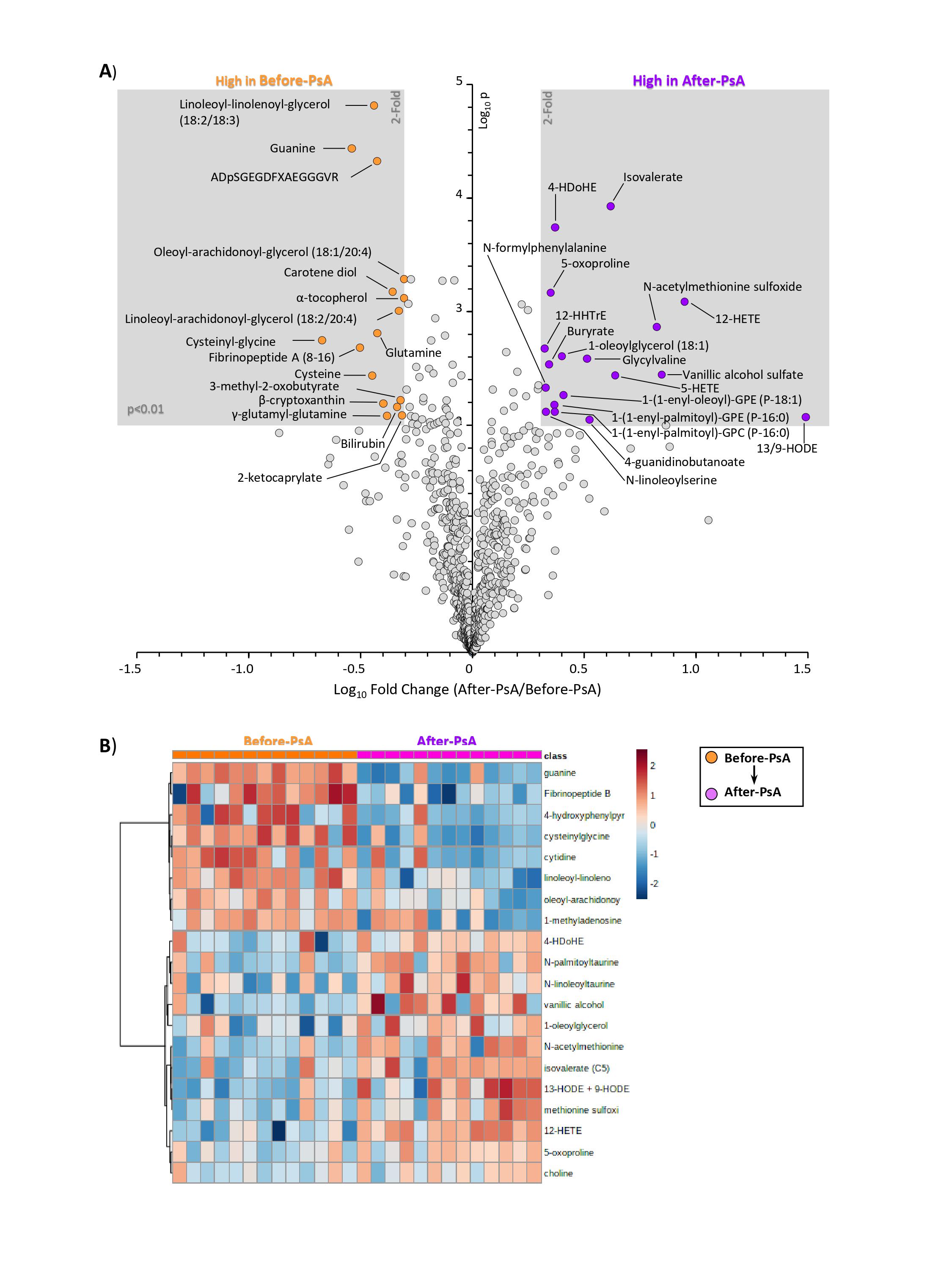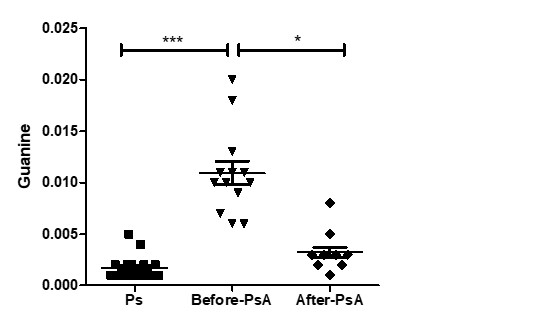Session Information
Session Type: Poster Session D
Session Time: 8:30AM-10:30AM
Background/Purpose: The transition to psoriatic arthritis (PsA) occurs in 20-30% of psoriasis (Ps) patients, but the mechanisms underlying the emergence of musculoskeletal disease are not well understood. We compared serum metabolites of Ps and PsA patients to identify potential biomarkers of arthritis risk in Ps patients.
Methods: To identify differentially abundant metabolites in the sera of Ps patients, we analyzed serum samples for metabolites in cohorts of psoriasis patients who progressed (PsP) and did not progress (PsNP) to PsA. We performed unbiased metabolomic profiling using reverse-phase, and Hydrophilic Interaction Liquid Chromatography coupled to Q-Exactive Mass Spectrometry of the serum samples collected from PsNP (n=20), and PsP (n=13), and healthy controls (HC, n=18).
Results: We identified several key metabolites linked to diverse metabolic pathways that differed between patients who did or did not progress to PsA and healthy controls. Among the differentially abundant metabolites were those related to purine, pyrimidine, glutathione, and lipid metabolism (Figure 1). We also noted that guanine and linoleoyl-linolenoyl-glycerol were significantly decreased (more than 50%, p < 0.001), after the onset of arthritis. In contrast, multiple metabolites related to lipid metabolism (4-HDoHE, 12-HETE, 12-HHTrE, and 1-oleoylglycerol), were elevated (more than 2-fold, p< 0.01) and 5-oxoproline, a metabolite related to glutathione metabolism, was also elevated in the samples (more than 2-fold, p< 0.001) collected after the onset of arthritis (Figure 1). These changes were not noted in HCs. We also found that guanine levels were elevated in PsP compared to PsNP patients (Figure 2). Most intriguingly, we also noted that serum guanine levels significantly decreased after the onset of arthritis (Figure 2).
Conclusion: We identified a set of metabolites that were differentially abundant before and after the onset of arthritis in Ps patients. During the transition from psoriasis to PsA, we observed a changing pattern of purine, lipid and amino acid metabolites over time. The elevated guanine levels in Ps patients at risk for arthritis was particularly striking and may reflect altered proliferation of immune cells and enhanced cytokine expression. These metabolites represent potential biomarkers for PsA risk in Ps patients.
 Figure 1. Metabolites different between before- and after the onset of PsA. (A) Volcano plot shows comparison between samples collected before (Before-PsA, orange) and after (After-PsA, purple) the onset of PsA (matched samples). X-axis shows Log10 of fold change. Y-axis shows –Log10 of p-value (pair-wise t-test). Metabolites achieving both statistical significance (p < 0.01) and greater than 2-fold difference between groups, are shown inside the shaded gray areas, and identified with labels. Data are means from n = 13 individuals. (B) Heat Map showing metabolite abundance (top 25) in individual patients (n = 13).
Figure 1. Metabolites different between before- and after the onset of PsA. (A) Volcano plot shows comparison between samples collected before (Before-PsA, orange) and after (After-PsA, purple) the onset of PsA (matched samples). X-axis shows Log10 of fold change. Y-axis shows –Log10 of p-value (pair-wise t-test). Metabolites achieving both statistical significance (p < 0.01) and greater than 2-fold difference between groups, are shown inside the shaded gray areas, and identified with labels. Data are means from n = 13 individuals. (B) Heat Map showing metabolite abundance (top 25) in individual patients (n = 13).
 Figure 2. Guanine levels in converters (PsP) and non-converters (PsNP). Serum guanine levels were compared between samples from patients who did (PsP, n = 13) or did not covert (PsNP, n = 20) to PsA and normalized data presented as a dot plot. For the PsA-converters samples were collected before (Before-PsA), and after (After-PsA) the onset of PsA (matched samples). ‘***’ indicates p-value less than 0.0001 and ‘*’ indicates p-value less than 0.01.
Figure 2. Guanine levels in converters (PsP) and non-converters (PsNP). Serum guanine levels were compared between samples from patients who did (PsP, n = 13) or did not covert (PsNP, n = 20) to PsA and normalized data presented as a dot plot. For the PsA-converters samples were collected before (Before-PsA), and after (After-PsA) the onset of PsA (matched samples). ‘***’ indicates p-value less than 0.0001 and ‘*’ indicates p-value less than 0.01.
To cite this abstract in AMA style:
Paine A, Brookes P, Li D, Bhattacharya S, Garcia-Hernandez M, Ritchlin C. Altered Metabolic Profiles in the Transition from Psoriasis to Psoriatic Arthritis: A Longitudinal Analysis [abstract]. Arthritis Rheumatol. 2021; 73 (suppl 9). https://acrabstracts.org/abstract/altered-metabolic-profiles-in-the-transition-from-psoriasis-to-psoriatic-arthritis-a-longitudinal-analysis/. Accessed .« Back to ACR Convergence 2021
ACR Meeting Abstracts - https://acrabstracts.org/abstract/altered-metabolic-profiles-in-the-transition-from-psoriasis-to-psoriatic-arthritis-a-longitudinal-analysis/
